Bhagavad Gita Summary | Spiritual Insights by Supreme God UK
 Minutes to read.
Minutes to read.
The Bhagavad Gita stands as a cornerstone of spiritual wisdom, offering profound insights into the nature of duty, righteousness, and the path to liberation. At Supreme God UK, we present a comprehensive summary of the Gita, delving into its teachings and interpretations to guide seekers on their spiritual journey. Explore the timeless wisdom of the Gita and uncover the path to true enlightenment.
The Great Hindu Religion – Read This First
Among all the religions and sects in the world, Sanatan Dharma (later known as the Hindu religion after Adi Shankaracharya's time) is the most ancient. Originally known as Sanatan Panth, this spiritual tradition was practiced according to the guidance found in the scriptures. After the influence of Adi Shankaracharya, the followers of this path came to be called Hindus, and Sanatan Panth became widely recognized as the Hindu religion.
The foundation of the Hindu religion rests on the four Vedas—Rigveda, Yajurveda, Samaveda, and Atharvaveda—and the holy Shrimad Bhagavad Gita. In the early ages, the spiritual practices of humankind were solely based on these divine scriptures. The Vedas were directly revealed by God, and their essence is captured in the Shrimad Bhagavad Gita, making it a God-given scripture as well.
Importantly, the knowledge given directly by God is completely true and flawless. Therefore, both the Vedas and the Gita are absolutely trustworthy and authoritative. Every human being should follow the spiritual path as instructed in these scriptures—this is known as practicing scripture-based worship.
Any form of worship that deviates from these divine instructions is considered arbitrary practice, which leads one away from liberation. This has been clearly warned against in Bhagavad Gita Chapter 16, Verses 23–24, where it is said that those who ignore scriptural injunctions and act according to their own will do not attain perfection, happiness, or salvation.
Bhagavad Gita Chapter 16, Verse 23: A person who ignores the injunctions of the scriptures and follows arbitrary practices does not attain siddhi (success in spiritual practice), nor does he achieve the supreme goal of moksha (liberation), nor even lasting happiness.
Bhagavad Gita Chapter 16, Verse 24: Therefore, the scriptures alone must be your guide in deciding what should be done (Kartavya) and what should not be done (Akartavya) in the matter of worship. Only those actions that are prescribed in the scriptures must be performed.
Dear Hindu Brothers and Sisters, To verify this for yourself, please refer to the original text in the Shrimad Bhagavad Gita Padachhed Anvaya—Chapter 16, Verses 23–24—published by Gita Press, Gorakhpur, and translated by Shri Jayadayal Goyandka Ji. The photocopy of the relevant section provides clear evidence of the scriptural warning against arbitrary, non-scriptural practices.
(Photocopy of Gita Chapter 16 Verse 23)
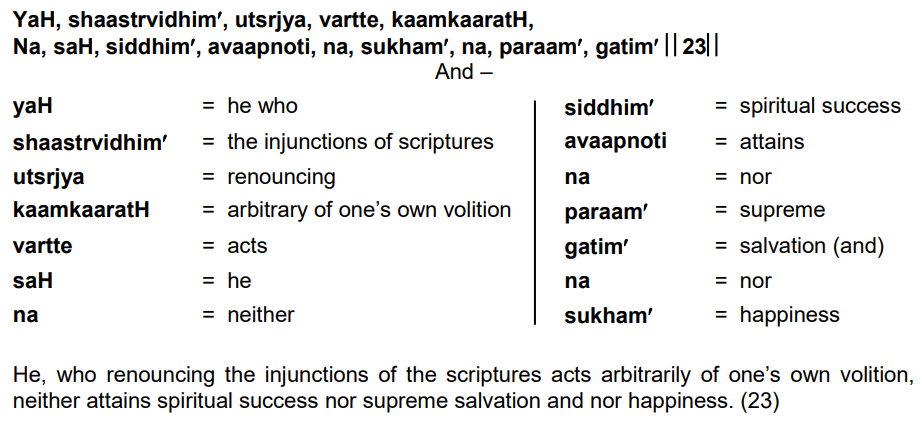
(Photocopy of Gita Chapter 16 Verse 24)
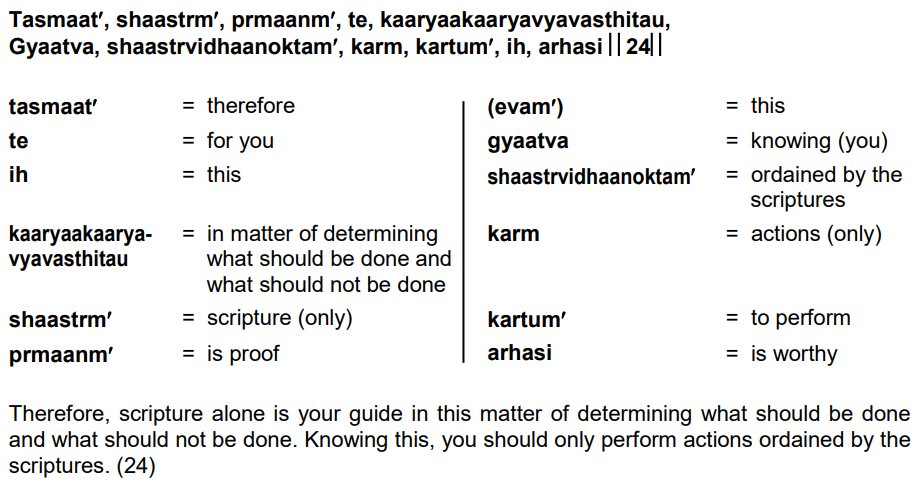
Hindu Brothers! Let us now read Holy Shrimad Bhagavad Gita Chapter 17 Verses 1-6
Gita Chapter 17 Verse 1: - In this verse, Arjun questioned the Lord who has given the knowledge of Gita that :-
-
O Krishna! Those men who, endowed with faith, worship the gods etc abandoning the injunctions of the scriptures, what is their state then, Satvik, Rajsi or Tamsi? (Gita Chapter 17 Verse 1)
The answer to this has been given in verses 2-6. The answer of the Lord who is the knowledge-giver of Gita: -
-
In brief, it is as follows: - The faith of men according to the impressions of their previous birth is Satvik, Rajsi and Tamsi. (Gita Chapter 17 Verse 2)
-
O Bharat! The faith of all men is according to their inner-self. Whatever faith one has, he himself is also that only, meaning that he is of the same nature. (Gita Chapter 17 Verse 3)
-
Satvik men worship gods. Rajas men worship Yakshas and demons and the others, who are Tamas men, worship spirits and ghosts. (Gita Chapter 17 Verse 4)
-
O Arjun! Those men, who only practice (arbitrary) severe religious austerity, which is not enjoined by the scriptures, and endowed with hypocrisy and arrogance, who are also full of desire, attachment and pride of power (Gita Chapter 17 Verse 5)
-
And those who torture i.e. cause grief to the group of material elements situated in the body, and me (the God who is the giver of the knowledge of Gita), dwelling in their hearts, know those ignorants to have demoniac nature. (Gita Chapter 17 Verse 6)
The same evidence is also in Gita Chapter 16 Verses 17-20. It is said that:-
-
Verse 17: - Those, who consider only themselves to be superior, haughty men, intoxicated by wealth and honour, perform religious rituals only in name for ostentation, without following the injunctions of the scriptures. (Gita Chapter 16 Verse 17)
-
Verse 18: - Given to egotism, power, arrogance, anger etc, men who criticise others, hate me (the knowledge-giver of Gita) who resides in their body and in the bodies of others. (Gita Chapter 16 Verse 18)
-
Verse 19: - I hurl those haters, the sinful and cruel degraded men, repeatedly in demoniac wombs in the world. (Gita Chapter 16 Verse 19)
-
Verse 20: - O Arjun! Those fools, instead of attaining me, birth after birth attain the demoniac wombs. Then they attain a further lower state than that i.e. they fall into deep hell. (Gita Chapter 16 Verse 20)
Conclusion of the above verses of Gita: -
In Gita Chapter 17 Verse 1, Arjun has asked that O Krishna! Those men who, endowed with faith, worship the gods etc abandoning the injunctions of the scriptures, what is their nature like? Arjun had earlier heard in Gita Chapter 7 Verses 12-15 that the worshippers of the three Gunas i.e. Trigunmayi Maya i.e. Rajgun Brahma ji, Satgun Vishnu ji and Tamgun Shiv ji etc. are limited to them only. Their intellect does not rise above them to my, the knowledge-giver-of-Gita’s, worship. Those who have lost their knowledge, who are of demoniac nature, lowest among men, evil-doers, fools do not worship me.
In Gita Chapter 7 Verses 20-23, the following has been said :-
The verses 12-15 have been repeated in these. It has been said that those whose knowledge has been carried away by the desires of those respective pleasures, being prompted by their own nature, adopting that very rule, that is, based on folklores, they worship other deities. This is prohibited in Gita that one should not worship Rajgun Brahma ji, Satgun Vishnu ji and Tamgun Shiv ji and other gods and goddesses. They worship the deities based on folklore after hearing from someone. They worship the deities against the injunctions of the scriptures, that is, they behave arbitrarily, which has been described as a futile religious practice in Gita Chapter 16 Verses 23-24. In Gita Chapter 17 Verse 1, Arjun has asked a question about the same that O Krishna! Those who, abandoning the injunctions of the scriptures, worship other deities of their own volition, what is their devotion like i.e. is their state Rajsi, Satvik or Tamsi?
The meaning is that those who worship Shri Brahma ji Rajgun, Shri Vishnu ji Satgun and Shri Shiv ji Tamgun and other deities, that worship is indeed against the injunctions of the scriptures, but they who worship other deities (akartavya) which should not have been done, what is their temperament like?
The giver of the knowledge of Gita has made it clear in Gita Chapter 17 Verses 2-6 above that those who have Satvik faith i.e. who are good human beings, they only worship other gods. Others who are Rajsi in nature worship demons and Yakshas. Those who are of Tamsi faith i.e. nature, they worship spirits and ghosts.
{Keep in mind that performing Shraadh, Pind-Daan, the ritual of immersing the ashes of the deceased in the Ganges River by the Pandit, Terahnvi (the ritual on the thirteenth day after the death of a family member), Varshi (the ritual after a year of the death of a family member), all these are called Karmkand (ceremonial rituals) which have been prohibited in the Gita. In the Vedas, it is called a foolish practice.
Markandey Puran
Evidence: - In Markandey Puran, in the chapter “Origin of Rauchya Rishi”, Sage Ruchi while following celibacy, lived in seclusion and performed worship according to the Vedas. When he turned 40, his ancestors appeared in the sky. They said to Sage Ruchi (father, grandfather, great grandfather who were Brahmins i.e. sages. They used to perform (Karmkand) ceremonial rituals. Due to which, they did not attain salvation. They were suffering in the lives of ghosts and Pitras (deceased ancestors). They had destroyed their lives by abandoning the injunctions of the scriptures and behaving arbitrarily. They were extremely distressed. They said to Sage Ruchi), “Son! Why did you not get married? Why did you not perform our Shraadhs etc ceremonial rituals i.e. karmkand?” Sage Ruchi replied, “O Forefathers! In the Vedas, ceremonial rituals have been described as Avidya (foolish practice). Then why are you asking me to do this.” The (Pitras) deceased ancestors said, “Son Ruchi! It is true that ceremonial rituals have been called Avidya in the Vedas. The spiritual practice that you are performing is the path of salvation. We are in great trouble. Get us liberated, meaning that get married, and by performing rituals like our Pind-Daan etc, get us liberated from the life of a ghost.” They themselves had become ghosts by abandoning the injunctions of the scriptures and arbitrarily performing ceremonial rituals. They led their son Ruchi (who was doing scripture-based worship) to hell by making him forsake true worship. Sage Ruchi got married. Then he performed the rituals. Then he also became a ghost. By performing Pind-Daan, one gets rid of the life of a ghost. After that, a living being gets the life of an animal or bird etc. What sort of a liberation is this? It is said in Sukshm Ved that: -
Garib, bhoot yoni chhootat hai, pind pradaan karant |
Garibdas Jinda keh, nahin miley Bhagwant ||
It is also clear in Gita Chapter 9 Verse 25. Gita Chapter 9 Verse 25: - Those who worship gods, go to the gods. Those who worship Pitras (deceased ancestors), go to the Pitras. Those who worship ghosts, go to the ghosts, that is, they become ghosts. Those who worship me (the knowledge-giver of Gita) come to me. Therefore, it is beneficial to worship according to the scriptures. Do like this.}
-
In Gita Chapter 17 Verses 5-6, it has been clarified that those who practice arbitrary severe religious austerity, which is not enjoined by the scriptures, and the above-mentioned worshippers of other deities i.e. Rajgun Brahma Ji, Satgun Vishnu Ji and Tamgun Shiv Ji and other gods and goddesses, those who worship ghosts and Pitras (performing rituals like Shraadh etc is worship of ghosts and Pitras), and those who worship Yakshas and demons, they torture the group of elements (the powers that reside in the lotuses) located in the body and me, the giver of the knowledge of Gita, located in the heart. Know those ignorant people to be of demoniac nature. In Gita Chapter 16 Verses 17-20, you read this same topic. It has been said that those who worship contrary to the injunctions of the scriptures, they hate me (the giver of the knowledge of Gita) who resides in their body and in the bodies of others, because they worship other gods. They do not worship the knowledge-giver of Gita i.e. Kaal. That is why, they have been called the haters? I hurl those haters i.e. the sinful, cruel, degraded men, that is, the worshippers of Shri Brahma ji Rajgun, Shri Vishnu ji Satgun and Shri Shiv ji Tamgun,- the three main powers of Kaal Brahm, and other gods and goddesses, repeatedly in demoniac wombs. (Gita Chapter 16 Verses 17-19)
-
It has been stated in Gita Chapter 16 Verse 20 that O Arjun! Those fools, instead of attaining me, birth after birth attain the demoniac womb. Then they attain a further lower state than that i.e. they fall into deep hell.
Clarification Regarding Worship of Brahma, Vishnu, and Shiv in the Gita
If someone argues that the worship of Shri Brahma Ji, Shri Vishnu Ji, and Shri Shiv Ji is not prohibited in the mentioned chapters and that the Gita refers to the worship of other gods, here is the clear response:
Nowhere in the entire Bhagavad Gita is the worship of Brahma, Vishnu, or Shiv instructed. Since their worship is not prescribed in the Gita, it stands outside the bounds of scriptural injunctions, and thus, according to Gita Chapter 16 Verses 23–24, such worship is futile and yields no spiritual benefit.
Despite this, many Hindu brothers worship a variety of deities without scriptural basis. This indicates a fundamental misunderstanding of the true knowledge (gyan) and special knowledge (vigyan) revealed in the Gita.
For scriptural proof, readers are encouraged to examine the photocopies of the relevant verses from Shrimad Bhagavad Gita Padchhed Anvay, printed and published by the renowned and trusted Gita Press Gorakhpur, with translations by Shri Jayadayal Goyandka.
(Photocopy of Gita Chapter 17 Verse 1)
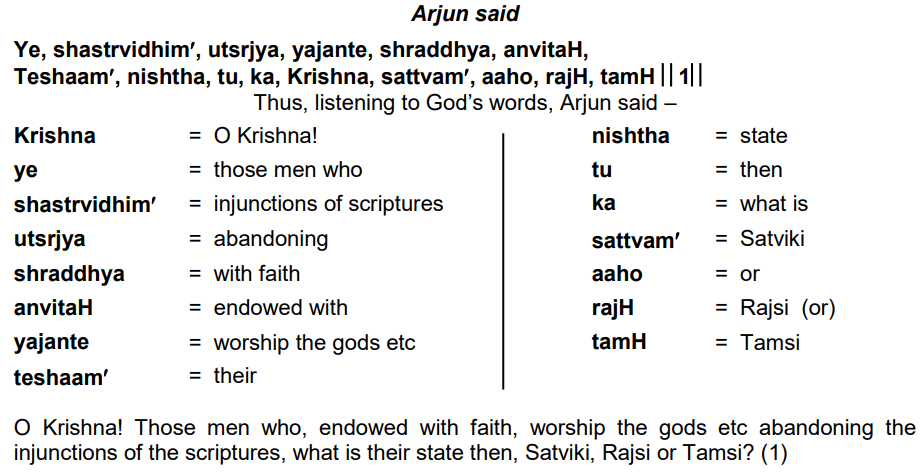
(Photocopy of Gita Chapter 17 Verse 2)
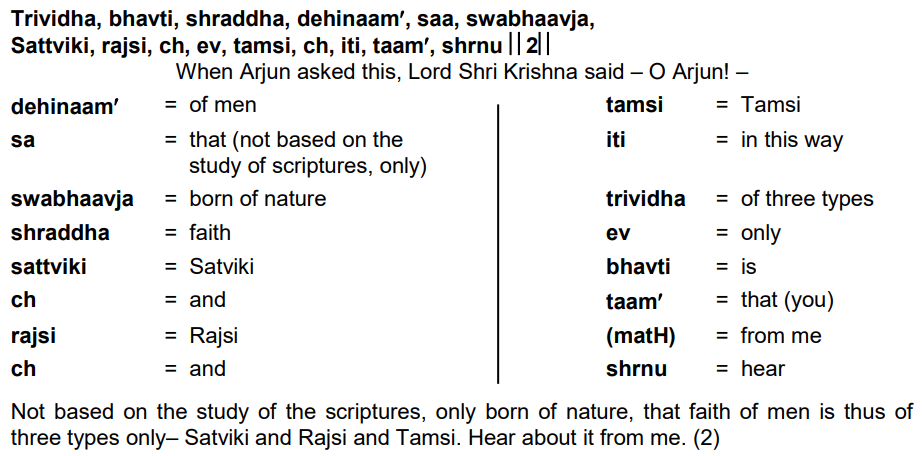
(Photocopy of Gita Chapter 17 Verse 3)
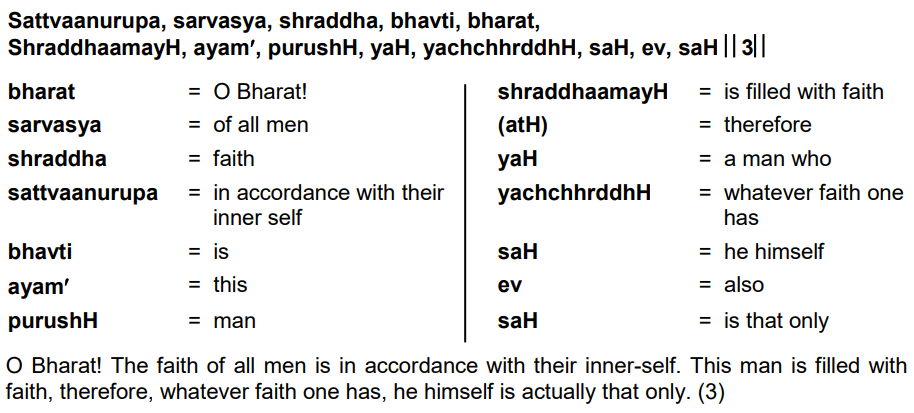
(Photocopy of Gita Chapter 17 Verse 4)
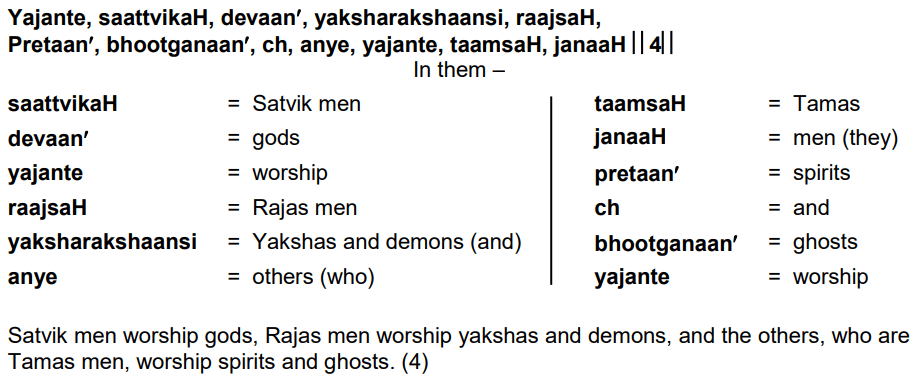
(Photocopy of Gita Chapter 17 Verse 5)
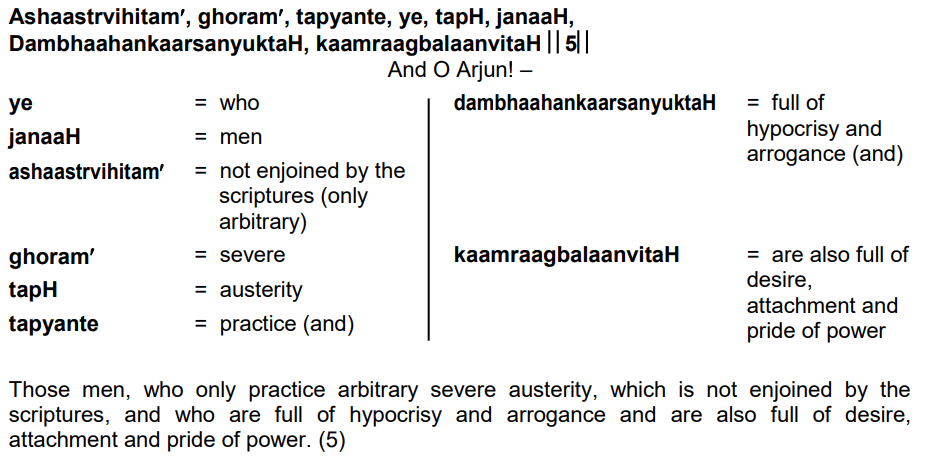
(Photocopy of Gita Chapter 17 Verse 6)
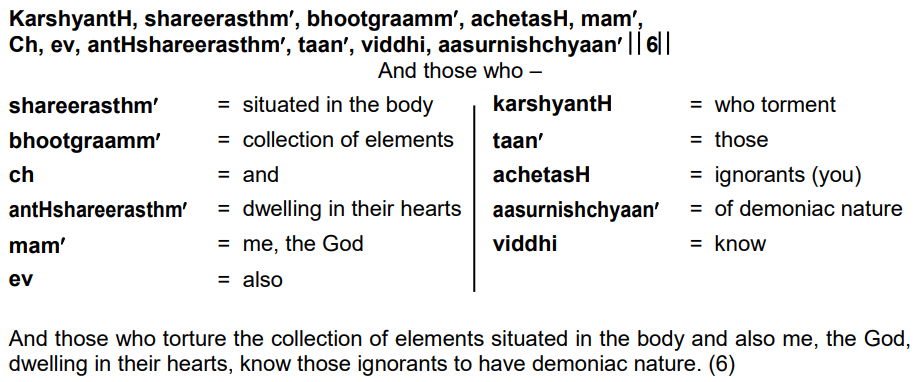
(Photocopy of Gita Chapter 16 Verse 17)
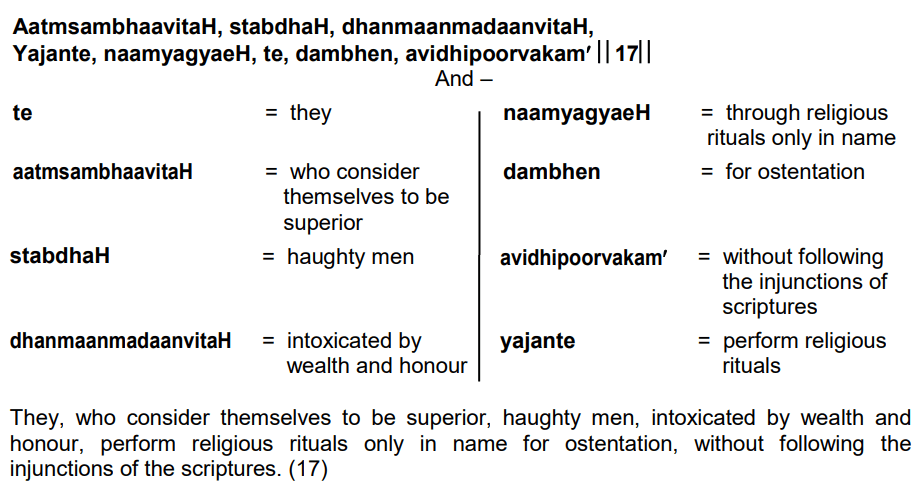
(Photocopy of Gita Chapter 16 Verse 18)
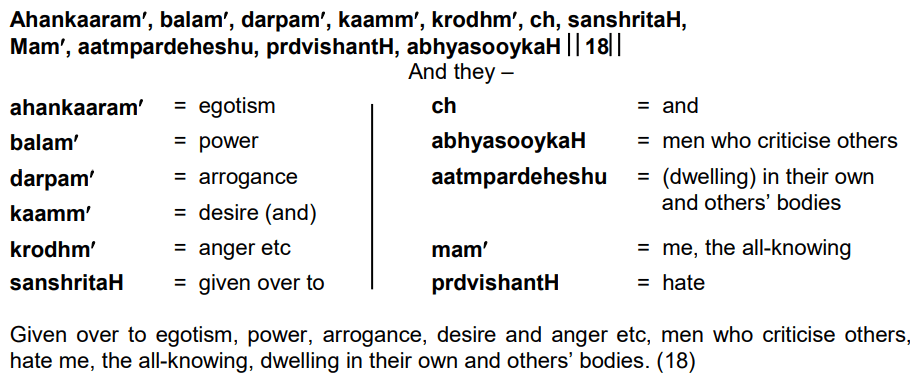
(Photocopy of Gita Chapter 16 Verse 19)
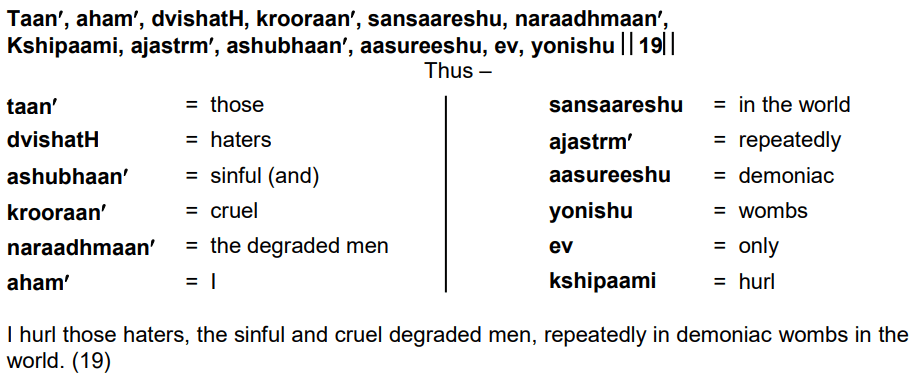
(Photocopy of Gita Chapter 16 Verse 20)
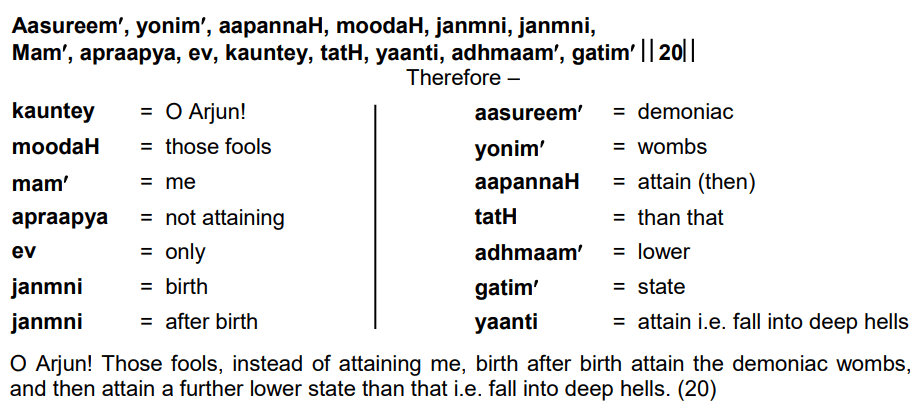
(Photocopy of Gita Chapter 16 Verse 23)

(Photocopy of Gita Chapter 16 Verse 24)

(Photocopy of Gita Chapter 7 Verse 12)
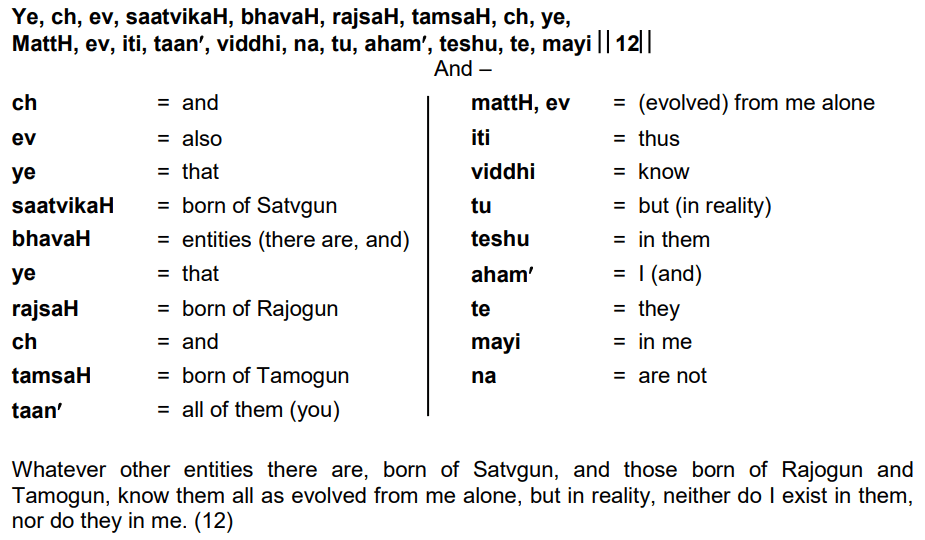
Important Insight: The speaker of the Bhagavad Gita—who is Kaal himself—has revealed that creation is carried out by Rajgun Brahma Ji, preservation by Satgun Vishnu Ji, and destruction by Tamgun Shiv Ji. He states that all these actions occur for his own sustenance, so that he continues to receive the food he requires.
In Gita Chapter 11 Verse 32, the knowledge-giver explicitly identifies himself as Kaal. Due to a curse, he is compelled to consume one lakh (100,000) human beings every day. This is why he has said that the activities of Brahma, Vishnu, and Shiv happen under his direction, yet he remains separate from them.
(Photocopy of Gita Chapter 7 Verse 13)
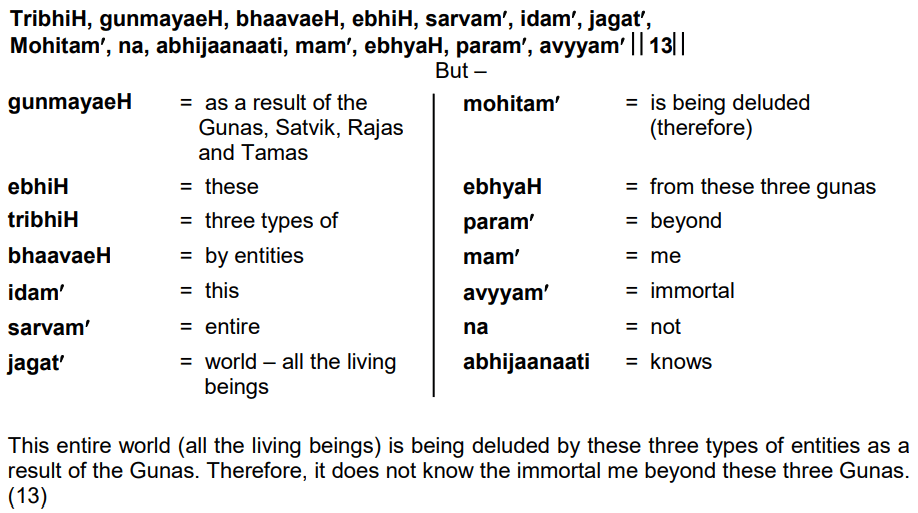
(Photocopy of Gita Chapter 7 Verse 14)
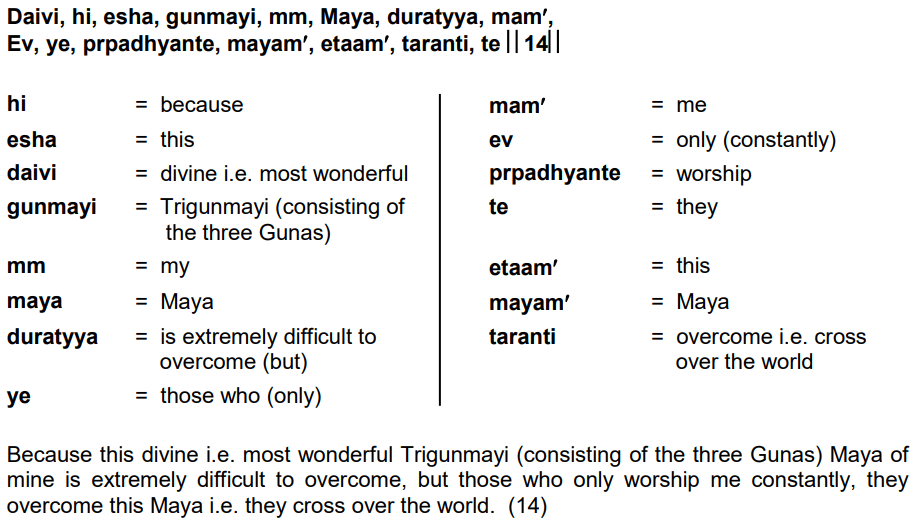
(Photocopy of Gita Chapter 7 Verse 15)
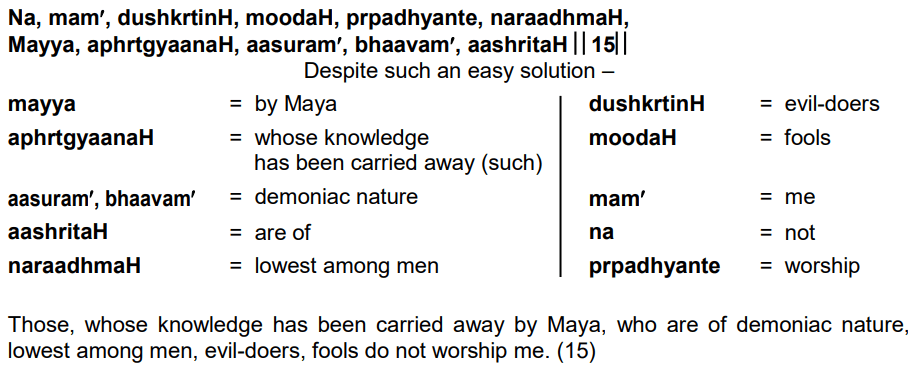
Important: In Gita Chapter 7 Verse 15, it is clearly stated that devotees whose unwavering faith rests in Rajgun Brahma Ji, Satgun Vishnu Ji, and Tamgun Shiv Ji have had their intellect overpowered by Trigunmayi Maya. Influenced by folklore rather than true scripture, they remain firmly attached to the worship of these deities and others.
Such individuals do not worship me—says the Gita speaker, who is Kaal Brahm—even though I am beyond these three. These souls are described as having a demoniac nature, being the lowest among men (naraadhama), evildoers, and fools.
(Photocopy of Gita Chapter 7 Verse 20)

(Photocopy of Gita Chapter 7 Verse 21)
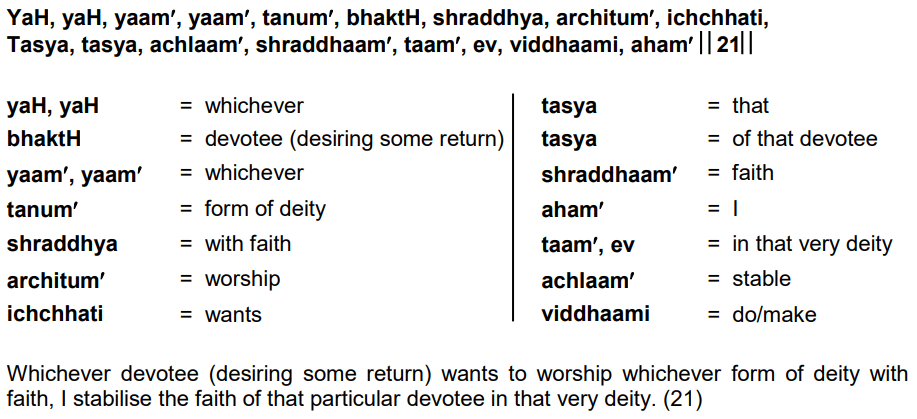
(Photocopy of Gita Chapter 7 Verse 22)
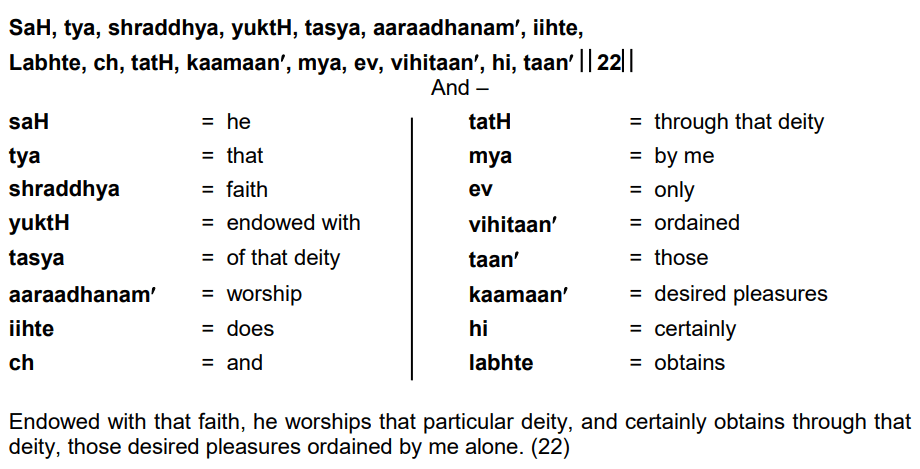
(Photocopy of Gita Chapter 7 Verse 23)
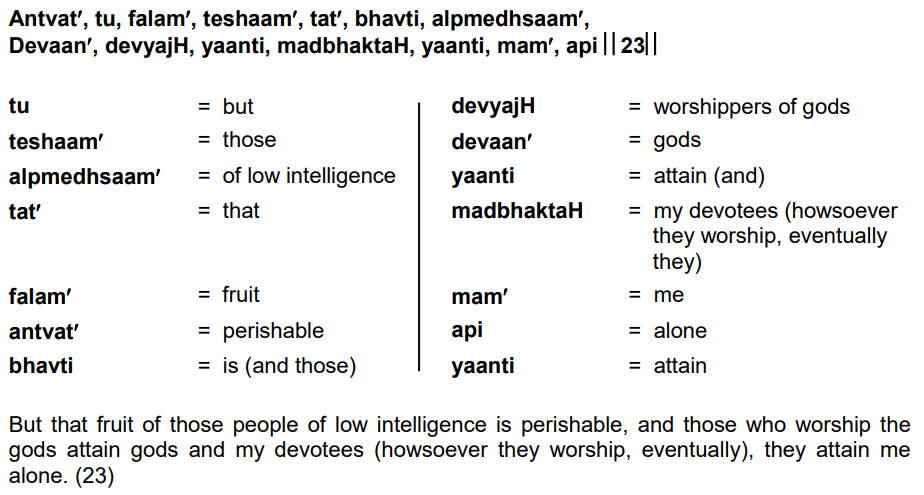
(Photocopy of Gita Chapter 7 Verse 25)
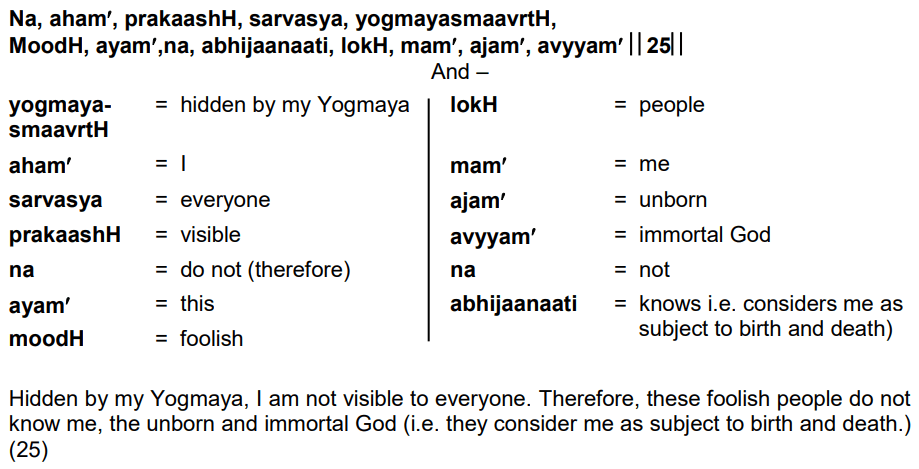
Special information
Question: Hindu brothers might ask—“The Puranas recommend performing Shraadh, visiting pilgrimages, and practicing religious austerities. Even sages and deities like Shri Brahma Ji, Shri Vishnu Ji, and Shri Shiv Ji performed meditation. Should we consider all of that wrong?”
Answer: According to Shrimad Bhagavad Gita, such practices—including severe austerities—are labelled as foolish, sinful, and cruel. Whether it is Brahma, Vishnu, Shiv, or any sage, they lacked the true understanding of the Vedas. If even they were unaware, how can ordinary beings possess that knowledge?
The Bhagavad Gita does not instruct anyone to undertake pilgrimages. Therefore, pilgrimage, Shraadh, and other such rituals fall under arbitrary practices, which go against scriptural injunctions. As per Gita Chapter 16 Verses 23–24, actions performed outside the boundaries of scriptural commands are fruitless and misguided.
Question: Are the Puranas not Considered Scriptures?
Answer: The Puranas are not the original divine scriptures. They are based on the personal experiences and interpretations of ancient sages. In contrast, the Vedas and the Shrimad Bhagavad Gita contain knowledge directly given by God and are considered absolute truth.
The sages attempted to understand the Vedas but misinterpreted the divine message. As a result, they developed practices rooted in folklore and hearsay, not scripture. For example:
- They adopted the chanting of the Om mantra from Yajurveda Chapter 40 Verse 15.
- The idea of meditation and religious austerity was borrowed from Brahma Ji.
- Based on this distorted understanding, they performed intense penance and gained siddhis (supernatural powers), but often misused them—destroying their spiritual progress by cursing or blessing in anger or ego.
Shrimad Bhagavad Gita (Chapter 16 Verses 23–24) warns that those who abandon scriptural injunctions and follow arbitrary spiritual practices gain no benefit. Moreover, those who practice extreme austerities are described as demonic, sinful, and cruel.
Example from History – Sage Durvasa
Consider the case of Sage Durvasa, a renowned ascetic. When the Pandavas were in exile, Duryodhan maliciously sent Durvasa to them with 88,000 sages, hoping they would fail to serve them and thus be cursed.
Now reflect: Durvasa, despite being a great practitioner of penance, went there with an evil intent—to bring misery upon the already suffering Pandavas. Wasn’t that a demonic and cruel act?
Later, the same Sage Durvasa cursed the entire Yadav clan over a trivial prank by just a few boys (including Pradyuman, son of Shri Krishna). As a result, 56 crore Yadavs perished, even Shri Krishna Ji was killed.
Ask yourself: Was such a widespread curse over a childish prank not the act of a demonic nature? Can such a person, driven by anger and ego, be considered righteous?
Actions of the Sages Who Composed the Puranas – A Critical Look
Sage Vashishth:
Consider some questionable actions of Sage Vashishth, a revered figure in the Puranas:
- He cursed a king to become a demon, leading the king to suffer in that form.
- He cursed another king to die simply because the king had his religious rite performed by someone else instead of him.
- In retaliation, that king also cursed Sage Vashishth to die, and both died as a result.
One version of Vashishth's rebirth, as per Puranic accounts, is even more bizarre:
Two sages were performing austerity (Tap) in a forest. A heavenly nymph (Apsara) appeared. Merely seeing her beauty, both sages ejaculated and released their semen into an empty pitcher. From that pitcher, two children were born—one was named Vashishth (a rebirth of the earlier sage), and the other was Sage Kumbhak.
Is this story befitting the dignity of a divine sage? Or does it reflect human weakness and spiritual downfall?
Sage Vishwamitra:
Originally a king, Vishwamitra renounced his kingdom to pursue intense meditation and acquire spiritual powers. But his actions reveal a troubling nature:
- When Sage Vashishth addressed him as a Raj-Rishi (a sage from a royal background), Vishwamitra became enraged.
- In a fit of ego and anger, he killed 100 sons of Vashishth using sticks and stones.
- Eventually, Vashishth called him a Brahm-Rishi, satisfying Vishwamitra's ego.
Just think: Is this the behavior of an enlightened sage or a person dominated by pride, anger, and vengeance? Is this not a demonic deed? The eighteen Puranas are the creations of such sages.
Sage Vishwamitra – A Reflection on His Actions
Once, Sage Vishwamitra was meditating in a forest hut when Menaka, a celestial nymph (Apsara) sent by Indra, appeared nearby. Enchanted by her beauty, Vishwamitra succumbed to desire and lived with her as husband and wife. A daughter, Shakuntala, was born from their union.
When the child was just six months old, Menaka revealed her real purpose—she was sent by Indra to test Vishwamitra’s celibacy. Declaring her task complete, she returned to heaven.
Vishwamitra, feeling defeated, left the child near Sage Kanva’s hermitage and again went deep into the forest to perform austerity. That child, Shakuntala, was later raised by Sage Kanva and eventually married King Dushyant.
Please reflect:
- Earlier, this same Vishwamitra had murdered Sage Vashishth’s 100 sons in anger.
- Then, he was ensnared by lust with Menaka.
- After these worldly entanglements, he once again resumed his penance.
Was this spiritual progress—or repeated downfall caused by arbitrary and misguided practice? Had he read the Gita, which warns against such folk-based, scripture-opposing austerity?
Sage Agastya
Sage Agastya also performed intense austerity and gained spiritual powers (siddhis). It is said he drank all seven oceans in one gulp and later refilled them—just to earn fame.
Ask yourself: Is this salvation? Or just a display of ego-fueled power?
Conclusion – Why Puranic Knowledge Must Be Tested
The eighteen Puranas are filled with such tales—based on personal experiences, egos, and failures of sages, not on the eternal truth of the Vedas or the Bhagavad Gita. The parts of the Puranas that do not align with Vedic knowledge are nothing but Lok Ved (folklore or hearsay) and must be rejected.
Unfortunately, modern religious leaders—Gita scholars, Acharyas, Shankaracharyas, Mahamandaleshwars—continue to promote these same folk traditions. As a result, followers of Sanatan Dharma (Hinduism) remain entangled in ignorance, practicing arbitrary worship, which the Gita (Ch. 16 V. 23–24) clearly declares to be futile and harmful.
The Giver of the Knowledge of Gita Advises Devotees to Seek Shelter in a Supreme God Other Than Himself
The present-day Gita scholars, Acharyas, and Shankaracharyas of the Hindu religion are unaware of a vital truth: In Bhagavad Gita Chapter 18 Verse 62, the giver of the Gita's knowledge clearly instructs Arjuna to take refuge in a Supreme God other than himself.
Yet, these scholars mistakenly claim that there is no higher deity than Shri Vishnu or Shri Krishna, identifying them as the ultimate authority and as the speaker of the Gita.
However, the actual truth is different:
Hindu Brothers did not Understand the Knowledge of Bhagavad Gita
The knowledge-giver of Gita had told Arjun in Gita Chapter 7 Verse 29 that "those worshippers who want to become free (moksh) from (jaraa) old age and (maran) death are familiar with Tat Brahm, complete spirituality and all the actions.”
Arjun asked a question in Gita Chapter 8 Verse 1 that – What is ‘Tat Brahm’ that has been mentioned in Gita Chapter 7 Verse 29? The Lord, who is the knowledge-giver of Gita, has given its answer in Gita Chapter 8 Verse 3 that He is "Param Akshar Brahm".
After this, in Gita Chapter 8 Verses 5, 7, the Giver of the knowledge of Gita has asked Arjun to do his bhakti, and in this same Chapter 8 Verses 8, 9, 10, he has advised to do bhakti of Param Akshar Brahm i.e. Sachidanand Ghan Brahm (Complete God) other than him. He has also clarified that the one who worships me, comes to me. He who worships Tat Brahm i.e. Param Akshar Brahm, goes to Him. Then he has told one letter ‘Om’ (ॐ) as mantra for his worship, and for the worship of the Tat Brahm (Param Akshar Brahm / Divine Supreme God / Sachidanand Ghan Brahm) he has told the mantra "Om (ॐ) Tat Sat".
In Gita Chapter 18 Verse 62, the giver of the knowledge of Gita has told that it is only possible to attain supreme peace and (Shashvatam Sthanam) the eternal supreme abode (which Sant Garibdas ji has called Satyalok / Amarlok) by going in the shelter of that same Param Akshar Brahm.
Sant Rampal Ji has given the above-mentioned knowledge and shown it in Holy Book Gita in videos through spiritual discourses. He has shown it to us i.e. Hindus and explained it by drawing conclusions. What our Hindu religious preachers / teachers / Manishis and Mandaleshwars could not understand, Das (the author) has understood.
Hindu Brothers may kindly read the photocopies of the above-mentioned verses: -
(Photocopy of Gita Chapter 7 Verse 29)
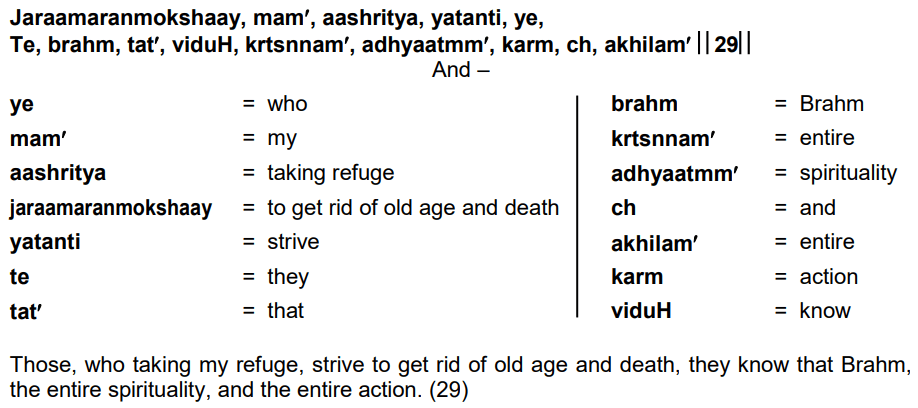
(Photocopy of Gita Chapter 8 Verse 1)
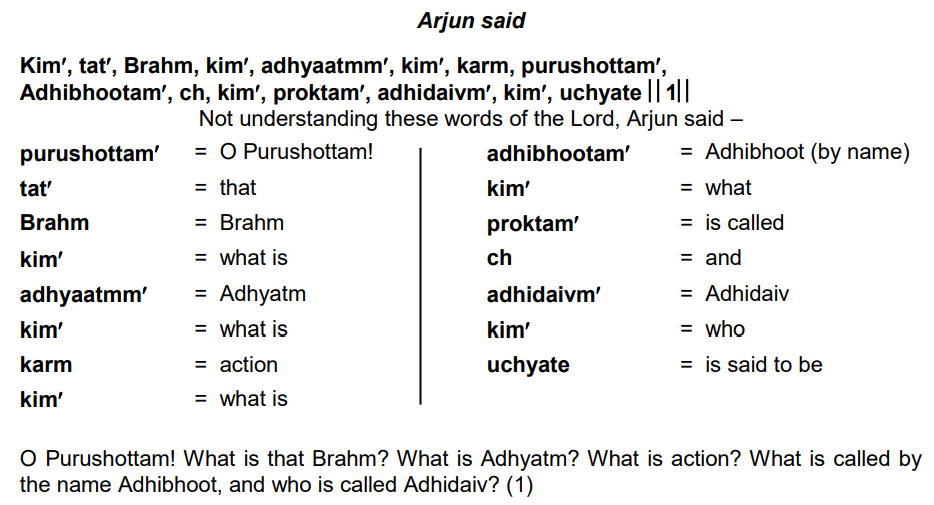
(Photocopy of Gita Chapter 8 Verse 3)

(Photocopy of Gita Chapter 8 Verse 5)
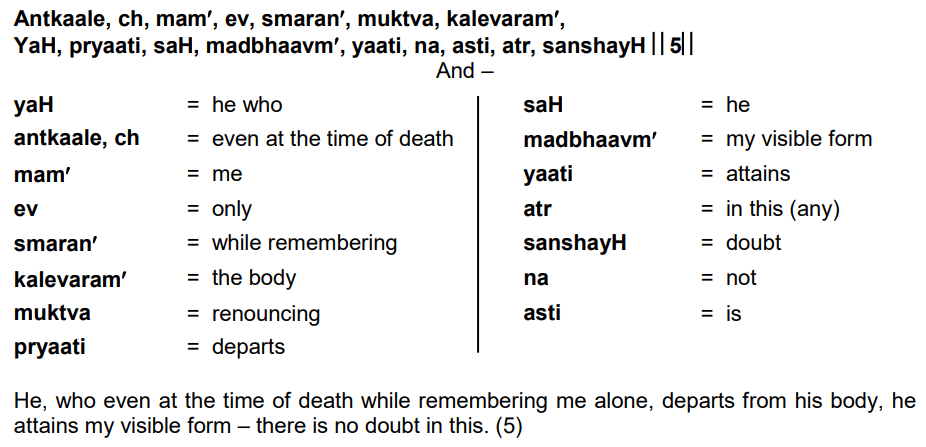
(Photocopy of Gita Chapter 8 Verse 7)
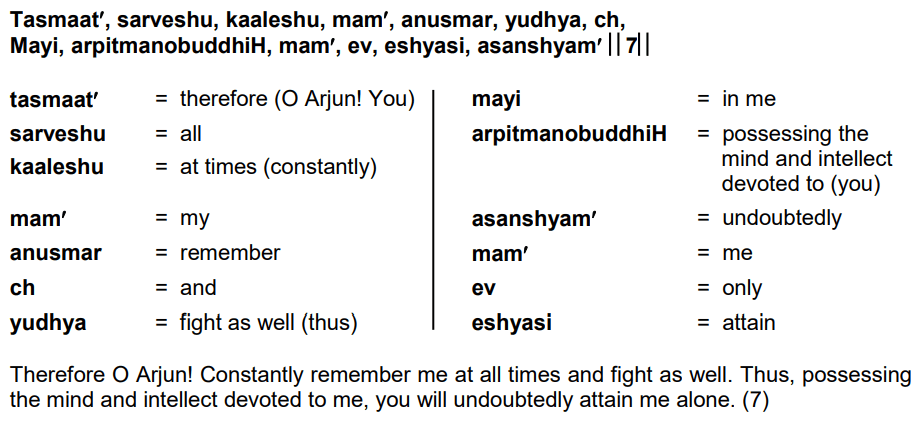
(Photocopy of Gita Chapter 8 Verse 8)
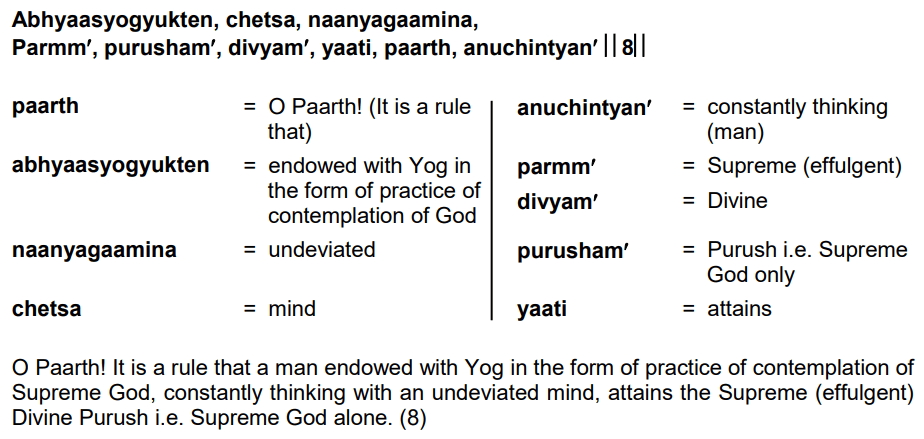
(Photocopy of Gita Chapter 8 Verse 9)
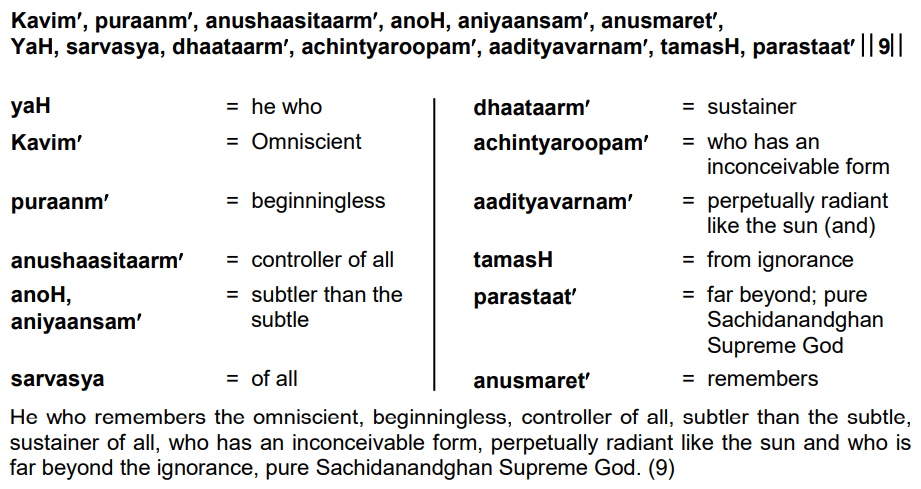
(Photocopy of Gita Chapter 8 Verse 10)
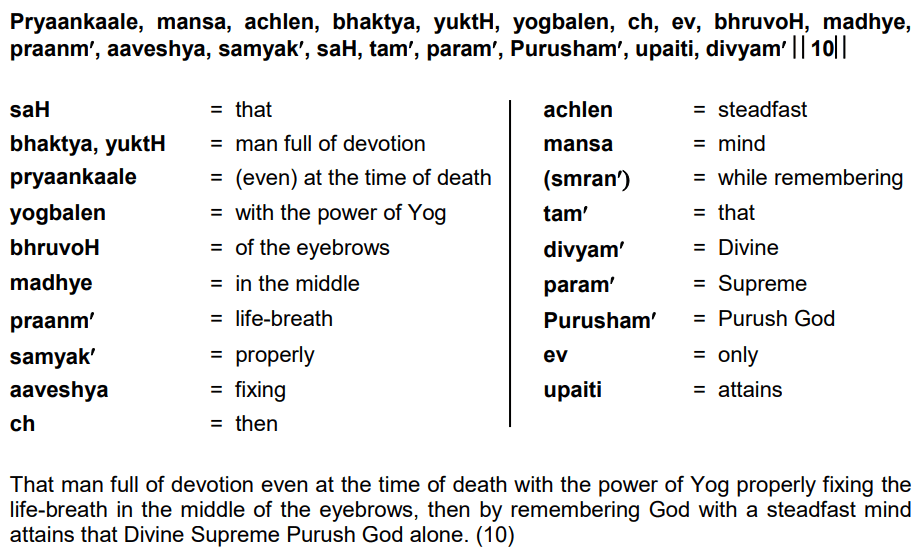
It becomes clear from this - “Hindus did not understand the knowledge of Gita”. {Scholar Sant Rampal Das understood this.}
Important: Hindu Brothers, Open Your Eyes to the Truth
Just as a pigeon cannot escape a cat by closing its eyes, we too cannot avoid reality by ignoring it. That is an illusion.
See the truth clearly. Acknowledge it. You are educated and thoughtful individuals living in the 21st century. India today is not what it was 200 years ago, when our ancestors, though pure-hearted, were largely uneducated. Believing religious preachers, Mandaleshwars, Manishis, Acharyas, and Shankaracharyas to be true scholars and Gita experts, they blindly accepted their words.
As a result, our ancestors abandoned scriptural guidance and engaged in arbitrary religious practices, destroying their chance at true spiritual progress. We too began following their path blindly, assuming it to be right.
But the reality is: The entire pious Hindu society has been misled by these so-called gurus who lack true spiritual knowledge.
Now is the time to open your eyes. Read the Gita again yourself.
In Gita Chapter 16 Verses 23–24, it is clearly stated:
“O Arjun! Those who abandon the injunctions of the scriptures and follow arbitrary conduct (worship) attain neither happiness, nor spiritual success, nor salvation (moksha).”
Hindu Brothers, please think! Devotional worship is done for these three things only
- To get happiness in life.
- Tasks to get accomplished; to have no crisis.
- To get salvation.
By performing religious practices and worship not prescribed in the scriptures, one will not get all these three things. Therefore, one should not do what is not prescribed in the Gita. This has also been clarified in Gita Chapter 16 Verse 24. It has been stated that:-
Gita Chapter 16 Verse 24: - Thus, for you, O Arjun! Scripture alone is the evidence in determining Kartavya (which religious practice should be performed) and Akartavya (which religious practice should not be performed).
- Hindu religious leaders and preachers, Acharyas, Shankaracharyas and Gita Manishis describe the Giver of the knowledge of Gita (whom they call Shri Krishna, the incarnation of Shri Vishnu) as immortal. They say that he does not have birth or death. He does not have any mother-father which is a lie.
You may see for yourself in Gita Chapter 2 Verse 12, Gita Chapter 4 Verse 5, Gita Chapter 10 Verse 2, the knowledge-giver of Gita (according to them Shri Vishnu alias Shri Krishna ji) says that
-
“O Arjun! You and I have had many births; you do not know, I know. (Gita Chapter 4 Verse 5)
-
O Arjun! It is not that I, you and all these kings and soldiers were not there before or will not be there in the future. Meaning, I (the knowledge-giver of Gita), you (Arjun) and all these soldiers etc were born earlier also, and will be born in the future as well. (Gita Chapter 2 Verse 12)
-
Neither sages, nor siddhs, nor the deities know my origin because I am the prime cause (originator) of all these. (Gita Chapter 10 Verse 2)
Hindu Brothers! Please read the photocopies of the aforesaid verses that is, Gita Chapter 16 Verse 24, Gita Chapter 4 Verse 5, Gita Chapter 2 Verse 12, Gita Chapter 10 Verse 2 of Shrimad Bhagavad Gita Padchhed Anvay, which is printed from Gita Press Gorakhpur and translated by Shri Jayadayal Goyandka: -
(Photocopy of Gita Chapter 16 Verse 24)

(Photocopy of Gita Chapter 2 Verse 12)
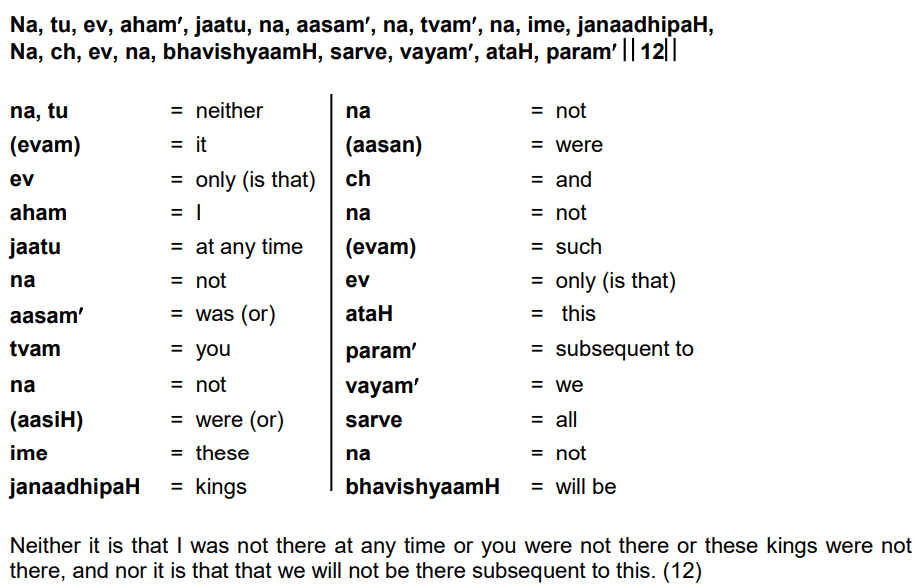
(Photocopy of Gita Chapter 4 Verse 5)
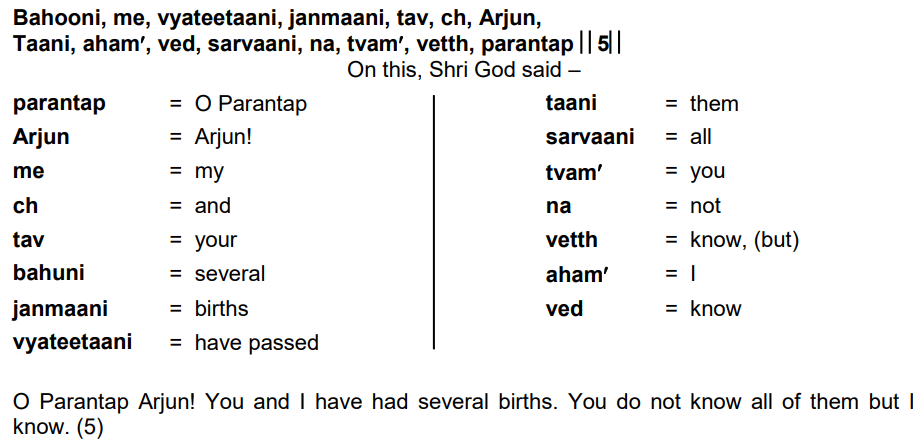
(Photocopy of Gita Chapter 10 Verse 2)

Readers, please think! The one, who takes birth and dies, is not immortal. He is perishable. He who is perishable cannot be the Almighty.
Question: - If the giver of the knowledge of Gita (Shri Vishnu alias Shri Krishna ji) takes birth and dies, that is, he is perishable, then who is the Lord who is imperishable, that is, free from birth and death other than the giver of the knowledge of Gita?
Answer: - This answer is in Gita Chapter 2 Verse 17 and Gita Chapter 15 Verses 16-17 and Gita Chapter 18 Verses 46, 61 and 62.
Gita Chapter 2 Verse 17: - (The giver of the knowledge of Gita has described the glory of God other than himself.) Know only Him to be immortal from whom this entire world has pervaded. No one is capable of destroying this immortal. {In Gita Chapter 18 Verse 46 also, the giver of the knowledge of Gita has described the glory of God other than himself.}
Gita Chapter 18 Verse 46: - The God from whom all the living beings have originated (and) from whom this entire world has pervaded, by worshipping that God through the performance of one’s natural activities, a man attains supreme spiritual success.
Gita Chapter 18 Verse 61: - {The giver of the knowledge of Gita has described the glory of God other than himself.}
O Arjun! God is situated in the heart of all the living beings, causing all the living beings mounted on the body-like machine to revolve (according to their deeds) by His Maya (illusory power).
Gita Chapter 18 Verse 62: - {In this verse, the giver of the knowledge of Gita has told Arjun to go in the refuge of God other than himself in every respect.} O Bharat! Go in the refuge of that God in every respect. (Only) By the grace of that God, you will attain supreme peace (and) the eternal supreme abode i.e. Satyalok (eternal place).
“Proof of - God other than the giver of the knowledge of Gita, the Imperishable, and the One who sustains all, and only He is God.”
In Gita Chapter 15 Verse 16-17 :-
In Gita Chapter 15 Verse 16, it is said that there are two Purushs (Lords) in this world. One is Kshar Purush and the other is Akshar Purush. Both these and all beings under them are perishable.
In Gita Chapter 15 Verse 17, the giver of the knowledge of Gita has clarified that:-
Gita Chapter 15 Verse 17 :- Uttam Purush i.e. Supreme God is other than the above Kshar Purush and Akshar Purush who is called Parmatma. He enters the three worlds and sustains everyone, and He alone is the Immortal God.
Hindu Brothers! Please read the photocopies of the above verses for proof, from Shrimadbhagvad Gita Padchhed Anvay which is published from Gita Press Gorakhpur and translated by Shri Jayadayal Goyandka:-
(Photocopy of Gita Chapter 2 Verse 17)
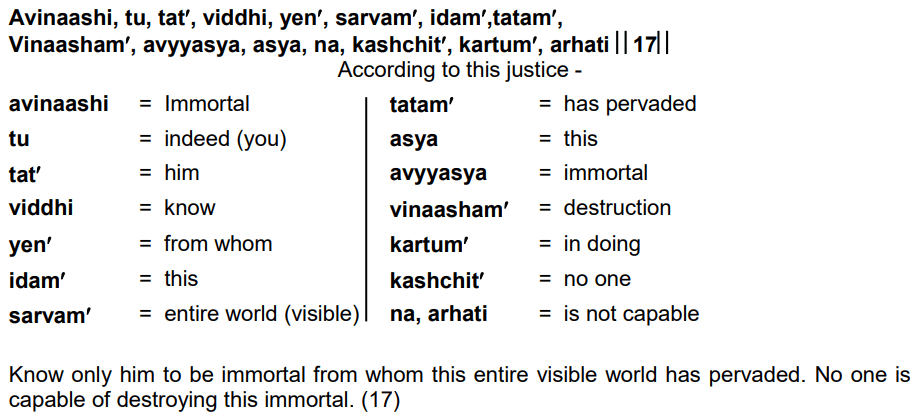
(Photocopy of Gita Chapter 18 Verse 46)
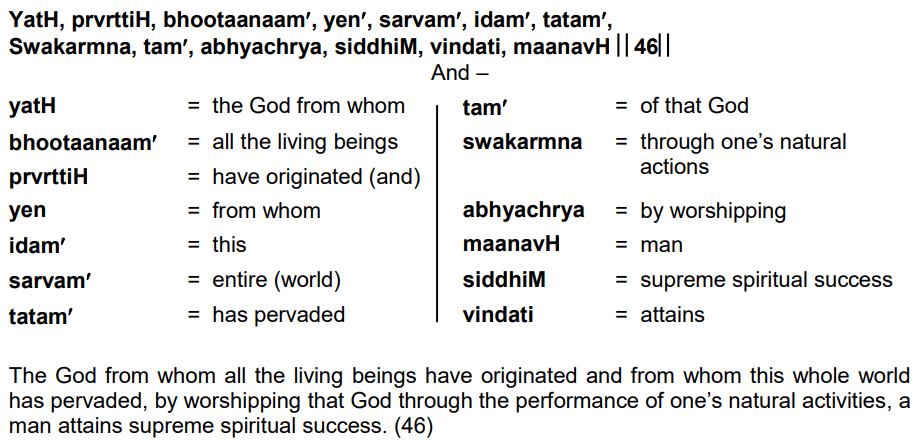
(Photocopy of Gita Chapter 18 Verse 61)
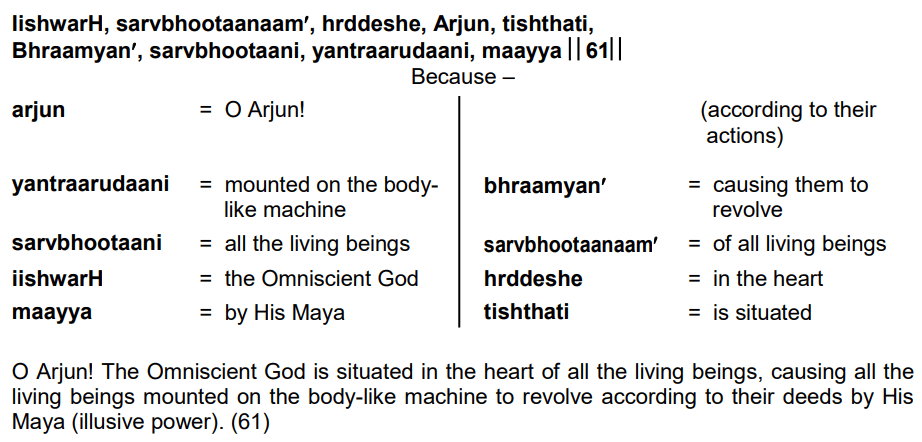
(Photocopy of Gita Chapter 18 Verse 62)
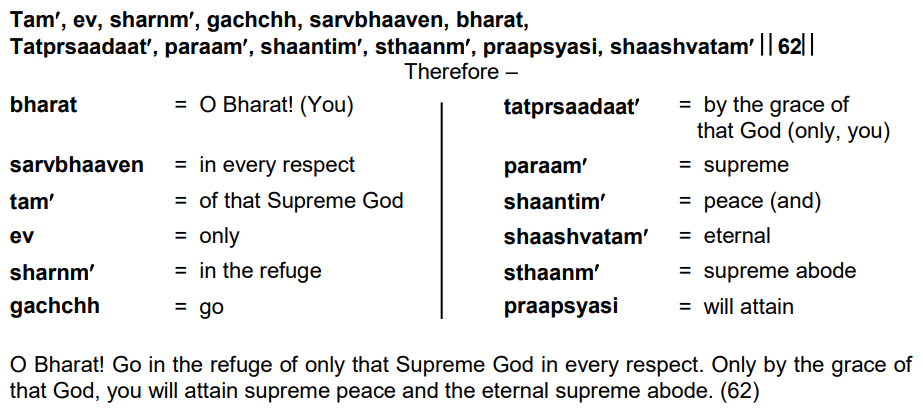
(Photocopy of Gita Chapter 15 Verse 16)
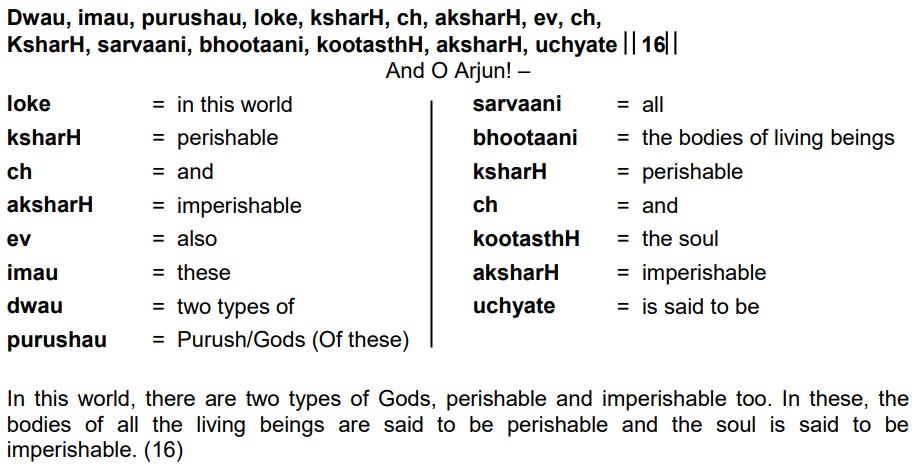
(Photocopy of Gita Chapter 15 Verse 17)
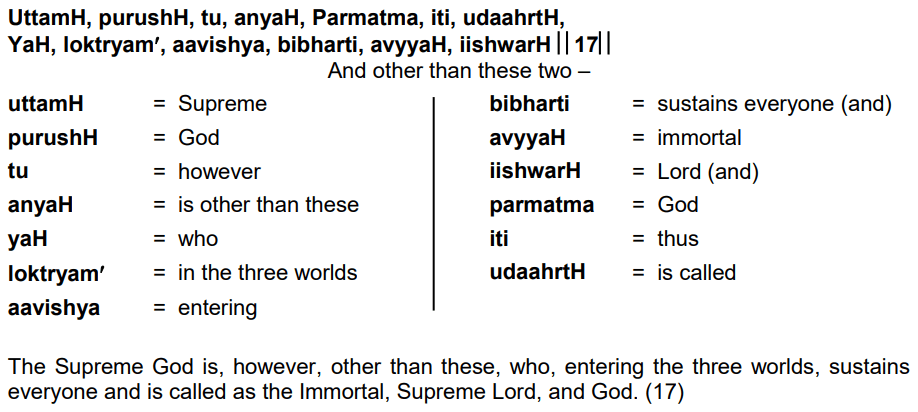
Removing the misconception: - In Gita Chapter 15 Verse 18, the giver of the knowledge of Gita has said that I am famous as Purushottam based on Lokved (legends) because I am the best of all living beings under me.
Please think:- In Gita Chapter 8 Verse 3, the giver of the knowledge of Gita has described Param Akshar Brahm (Purush) as different from himself. In verses 5-7, he has advised to do his worship, and in verses 8-9-10 of Gita Chapter 8 itself, he has advised to worship Param Akshar Brahm i.e. Param Akshar Purush / Sachidanand Ghan Brahm i.e. Divya Param Purush (Supreme God). In Gita Chapter 8 Verse 9 also, he has described Him to be the one who sustains everyone. Similarly, in Gita Chapter 15 Verse 17, he has called the Param Akshar Purush other than himself as Purushottam. He has called Him alone as the Immortal God who sustains everyone. Then in Gita Chapter 15 Verse 18, he has explained his position that I am famous as Purushottam on the basis of Lok Ved (hearsay / folklores). {Actually, Purushottam has been mentioned above in Gita Chapter 15 Verse 17.}
Some people on reading verse 18 say - Look! The giver of the knowledge of Gita is calling himself Purushottam. There is no Purushottam other than him. The answer to his foolish thought has been elucidated above.
Question:- In the scriptures, which devotional actions (kartavya) are worth doing and which actions (akartavya) are not worth doing?
Answer:- In Shrimad Bhagavad Gita Chapter 8 Verse 13, the Lord who gave the knowledge of Gita has only told one letter ॐ (Om) to be chanted for his worship. Apart from this, other mantras are (akartavya) not to be chanted.
In Gita Chapter 3 Verses 10-15, performance of Yagya (religious ritual) is said to be (kartavya) an act of worship worthy of doing. It has been advised to establish (Param Akshar Brahm) the Immortal God in the form of God in them.
There are five types of Yagya:-
- Dharm Yagya
- Dhyaan Yagya
- Havan Yagya
- Pranaam Yagya
- Gyan Yagya.
A Tatvadarshi Saint tells the method of doing these. This evidence is also in Gita Chapter 4 Verses 32-33-34. It has been said that Sachidanand Ghan Brahm (Supreme God) explains Tatvgyan (true spiritual knowledge) in the speech spoken from His lotus-mouth. It leads to complete salvation. After knowing it, you will become completely free from the bondage of actions. (Gita Chapter 4 Verse 32)
Gita Chapter 4 Verse 33:- O Parantap Arjun! Gyan Yagya (Yagya of knowledge) i.e. listening to the sermon of a Tatvdarshi Saint is superior to a Dravyamay Yagya (religious ritual performed by spending money), because a Tatvdarshi Saint tells the scriptural method of doing meritorious deeds and chanting mantra etc. For example, due to lack of knowledge, Karna (the sixth Pandav) only donated gold. As a result, he was left on a mountain of gold in heaven. When he became hungry, he asked for food. He was told that you did not (Dharm Yagya) donate food. You only donated gold. Therefore, you will not get food. If Karna had found a Tatvdarshi Saint, he would have attained complete salvation by doing all the five yagyas. Therefore, it has been said in Gita Chapter 4 Verse 33 that Gyan Yagya is superior to Dravyamay Yagya, that is, (Gyan Yagya) by listening to the knowledge of a Tatvdarshi Saint, one finds out which devotional actions are according to the injunctions of the scriptures?
In Gita Chapter 4 Verse 34, it has been said that understand that Tatvgyan (true spiritual knowledge), which Sachidanand Ghan God narrates by uttering speech through His mouth, and which is written in that speech, by going to Tatvdarshi Saints. By duly prostrating oneself before them, by serving them and giving up deceit, asking them questions with simplicity, those knowledgeable Mahatmas, who know the essence of God, will instruct you in that Tatvgyan (true spiritual knowledge).
Conclusion
That Tatvgyan (true spiritual knowledge) is with me (author – Rampal Das), which Sachidanand Ghan Brahm Kabir Ji Himself revealed through Sukshmved (also called Swasamved) by directly uttering divine speech—Kabir Vaani—from His lotus mouth.
This eternal knowledge was first written down by Shri Dharmdas Ji of Bandhavgarh, a devoted disciple. Later, God Kabir Ji imparted the same divine wisdom to His beloved soul, Sant Garibdas Ji, and even showed him His eternal abode, Satyalok, with divine vision.
Sant Garibdas Ji then described the eye-witnessed glory of God Kabir Ji. Sukshmved contains complete spiritual knowledge, far beyond what is available in the four Vedas—Rigved, Yajurved, Samved, and Atharvaved. Though these Vedas contain fragments of truth, much of the knowledge was omitted over time.
To restore the complete path to liberation, Supreme God Kabir Ji Himself descended to Earth and delivered the full, undistorted Tatvgyan.
Read Chapter 1 Summary
